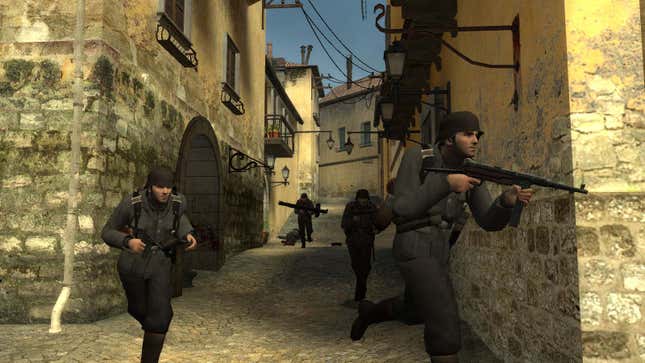
As I was growing up, I hated sports. When I was nine, I quit football after two weeks to my dad’s disappointment. By the time I got to high school, I wasn’t playing any sports or in any clubs. I was a happy person with dear friends, but I had never been a part of a team. I had never felt the satisfaction of a group of people with unique skills coming together to accomplish a larger goal. I had no idea what I was missing, until I joined the First Special Service Force.
I’ve lived my entire life in Bakersfield, California, a conservative city whose biggest claim to fame is the country stars who emerged from here in the 1960s. That, and our running record for the worst air quality in the country. It’s a city of hundreds of thousands with surprisingly little to do. By 2013, I was a 16-year-old high school junior whose main hobby was video games. I had finally acquired a laptop that could run (some) games and was eager to play with one of my friends from school.
At the time, he was really into this old WWII shooter called Day of Defeat: Source. Released on Steam in 2005, only two years after the service first launched, DoD:S is the oft-forgotten WWII multiplayer shooter made by Valve. DoD:S feels a lot like other 2000s Source Engine shooters like Team Fortress 2 and Counter-Strike: Source, but it sits somewhere between the two mechanically. It has the class structure of TF2 (six classes, consisting of Rifleman, Assault, Support, Sniper, Machine Gun, and Rocket) and the grounded gunplay of CS. I asked my friend why he was playing such an old game that hadn’t been updated in years. Besides the fact that it was still pretty fun, he said, it was really because he had recently joined a unit called the First Special Service Force.
He explained that it was similar to an in-game clan or MMO guild. The unit would meet up every day for unit-only activities or just play with “pubs,” their word for players who weren’t in the unit. Every member’s Steam username included their rank, name, and unit tag.
I had been in few random, unorganized clans in Call of Duty and Battlefield before, but my friend insisted that this was different. The FSSF was organized and its members were disciplined. What really intrigued me was that the unit’s leader, Colonel B. Seadog, was said to be a Vietnam War veteran, applying the same tactics he used in real life inside of DoD:S. I’m no military aficionado, but the game was fun and it sounded too interesting to pass up. After a few days of playing on the server, I was invited to apply to join.
When I joined the FSSF, I didn’t know how deep the roleplay went. Most units upheld a certain amount of military pageantry, but Seadog ran a comparably tight ship. I was introduced to the FSSF forums, where I read the official unit constitution by which I had to abide. The sections of the forums were all themed to those of a military base, and the posting requirements were strict for each purpose. There was a “mess hall” for general discussion, enlistment offices for new members, a voting booth for the rare issue that comes to a vote, a merit hall for promotions, and “offices” for all of the command staff to post personal topics.
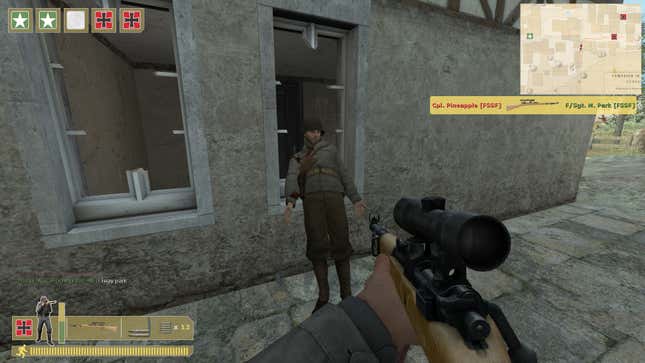
Right off the bat, the FSSF constitution required more commitment and rule-following than any in-game clan I’d ever seen. If you were online, participating in unit activities was mandatory. If you were caught playing another game during a meeting or practice scrim, it could result in a dishonorable discharge from the unit. Repeatedly speaking out of turn or interrupting a higher-up during an activity were grounds for demotion. Speaking about our tactics among non-unit members was strictly prohibited. Seadog would get particularly heated if that rule was broken.
In other units, it was normal to “salute,” or press the hotkey you’ve mapped to type the phrase “*salute*” in chat, at higher-ranked members when they joined the server. In our unit, Seadog only allowed this if the member was also a veteran.
My official FSSF tag was Private M. Park. For most of 2013, I hurried home from school every day so I wouldn’t be late for scrims. Every weekend, I attended hours-long drills led by Seadog to hone our skills. As the lowest rank on the totem pole, I didn’t carry much power. I had to follow any order given by anyone of a higher rank, no matter what. If I took issue with an order, there was an official complaint process on the forums. I was there to learn the game, so I was more than willing to stay quiet and listen.
Our main unit activity was the daily “realism scrim,” a mod installed on the server that converts the traditional chaotic Day of Defeat capture point mode into a one-life attack vs. defense mode similar to Counter-Strike. After choosing the day’s leaders, all members would stand “at attention” (against a wall in a row, with your gun angled down so it isn’t pointed at a superior) while teams are chosen one by one. For months, I was always among one of the last chosen, like the last kid chosen in dodgeball in PE class. It hurt a bit, but I knew where it was coming from.
I wasn’t a great shot, but I loved the hell out of scrims. The one-life format gave every moment heart-pounding stakes. I especially enjoyed playing defense, where leaders assign everyone’s weapon class and decide where they should be placed before the attackers began their assault. Whether I was placed in the back as a last-resort rifle or up front in a crossfire, I was satisfied slotting into my small role. While the leader was worried about the whole map, I only had to think about the one doorway I was securing. Usually in a game like this, leaving oneself exposed from other angles is a bad plan. But I placed complete trust in my team that they were watching where I couldn’t. That was my favorite feeling.
After a few weeks of getting to know other members and scrimming, the FSSF quickly became the best part of my day. I fantasized about scrims during classes. At lunch, my friend from the unit and I would talk about the previous day’s scrims like post-game commentators on ESPN. On the weekends, I made myself available, and happily showed up to Seadog’s drills. We learned a lot of useful tactics, like how to properly place smoke grenades and cross dangerous streets, how to peek out windows from unexpected angles, or how to safely fall back from a disastrous early defense. Every new tactic came with a brief Vietnam anecdote, detailing how Seadog himself had apparently used it on a real battleground.
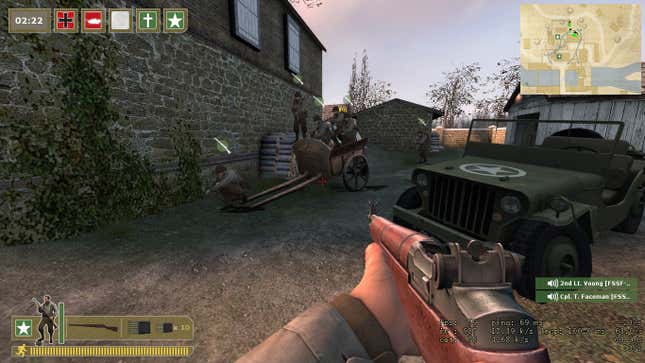
The Seadog war story that I remember best involved a friend of his getting killed because he trailed off from the group and walked through a gate that wasn’t previously cleared. He’d often use that one as a warning to always follow the leader’s command. Even if his lessons didn’t always seem applicable to a video game, we respected his experience and appreciated how much effort he put in to teaching us.
Drills were mostly fun, but Seadog had a quirk that often made them a drag. As he was teaching about an in-game tactic, he’d suddenly trail off into a lecture about unit commitment and loyalty. These were some of Seadog’s favorite topics. He preached at most weekly meetings that scrims needed higher attendance and that members should stop playing on other servers. He would often point to his captains and lieutenants as shining examples of unit members—those who show up every day and never question an order.
His other favorite topic of conversation, by far, was our enemies. Large swaths of his speeches were dedicated to reminding us that we were “under attack” by hostile units. The worst of them all, by Seadog’s accounts, was a rival unit called the 6th AB. According to him, they wanted to “destroy us.” Any 6th AB member that joined our server or forums was immediately banned on sight. I heard that the feud began because former FSSF members left to form the 6th AB, but it was never clear what they had actually done to wrong us.
If the 6th AB really wanted to destroy us, they weren’t putting in much effort. At most, they’d occasionally enter the server and troll a bit by breaking our “no cursing” rule. Other times, they just wanted to play because, in 2013, few other Day of Defeat servers were still populated. Regardless, their mere existence bothered Seadog to his core. Like a religious leader, he harnessed his disdain for the “others” to unite us against a common enemy and strengthen our allegiance to him. To watch his propaganda work against impressionable members was almost impressive, but it was also a sobering moment that reminded me just how seriously he took this video game.
Seadog’s ugly side could really come out at drills. Some days, I could tell he was in a terrible mood, and he let it show on members. I recall several days when he’d line us all up and order us to traverse a piece of the map using our learned tactics. We’d each go one at a time, trying to parse what he actually wanted by running across quickly, crawling to avoid detection, or a combination of the two. If you did it wrong, he’d shoot you in the head and let out a heartless “nope.” I’d been killed countless times in video games before, but this felt aggressive and demeaning. He’d keep dropping bodies until someone finally did it “right,” by which point we were all fed up.
I wanted to learn more about Seadog and his life after the war, but that proved near impossible. For as open as he was about the gruesome details of Vietnam, he kept every other part of his life completely private. He refused to share his real name or a photo of himself. He hid his exact age, but we determined he was likely in his late 60s or early 70s. All I knew were the small things that slipped out in my time with him—like how he loved to eat lasagna and drink black iced tea during drills, or how he taught self defense to women and was unsurprisingly a staunch conservative with views on things like race and sex that, as you might imagine, I disagreed with. We also learned that he lived in Canada, but that much was obvious by his accent.
It felt like Seadog didn’t want to be Google-able, but my friends and I were always curious why. Was he just a private person, or was he hiding something from us? I wanted to believe the former, but he made a lot of big claims. We considered the possibility that he was a fraud—that he embellished parts of his career and didn’t want anyone to pull the record. With our novice investigative skills, we checked up on a name we thought might be Seadog, but couldn’t find anything conclusive. To this day I can’t tell you for sure that Seadog is who he says. I believe that he’s a veteran, but that’s as far as it goes. All I know is that he enjoyed being the Colonel.
But as time went on, even that seemed debatable. Seadog’s meetings grew more focused on deception, enemies, and spies. He spoke about spycraft as if it were a simple fact of Day of Defeat unit culture. He claimed to have several undercover operatives feeding him information from other units. He’d regularly mention that he knew the identity of spies within our unit, but never went so far as to publicly accuse anyone. Of course, we never saw any evidence of this being true. Not only did it seem logistically unlikely, but there was simply no reason for spies in the first place. We weren’t that interesting. Seadog was living in his own world of paranoia, and he was trying to drag us into it. For many, it worked.
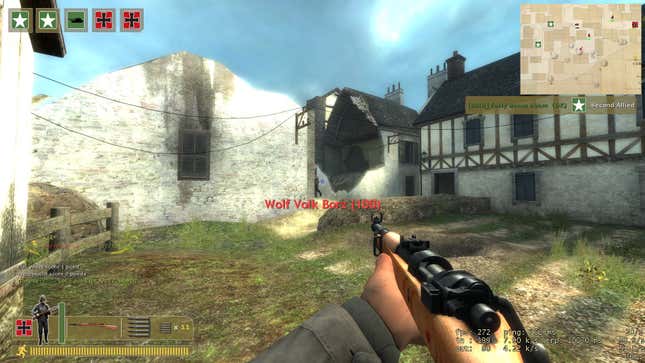
Months into my FSSF career, I had climbed the ranks through corporal, sergeant, and eventually lieutenant. I was still having a lot of fun with my unit friends, but the cracks in the machine were starting to show. Seadog was tired of everyone taking the unit for granted, whatever that meant, and had basically disappeared. Several command staff members had also become less active, but we still held scrims on schedule. It was clear there was a power vacuum, and people wanted to fill it. A few members of the Military Police, a subset of trusted members with extra authority to enforce rules, used their status to take control. That would have been fine by me, except that they were kind of assholes.
More and more, the remaining command staff and Military Police looked at every action with an uncomfortable amount of scrutiny. Anyone breaking a small rule, like speaking out of turn or forgetting to put on unit tags before joining the server, would get called out in front of everyone like a public shaming. Disagreements over rules were devolving into open arguments between lower-ranks and superiors—which would naturally lead to the lower-rank receiving demerits on their record for not following an order. Every day felt like a new opportunity for an MP officer to go on a power trip. They seemed to enjoy it. For my close-knit group of unit friends, the combination of the overzealous military police and Seadog’s paranoia was starting to ruin our fun. My favorite hobby felt like a dead-end job with a crappy boss.
It felt like our time in the FSSF was coming to an end, but we didn’t want to stop being in a unit. So we decided to start our own. Throughout the next month, we prepared our name (11th Canadian Infantry Division), created forums, and rented a server. We wanted to send the message that we were exhausted with how things were currently done. We wanted a casual environment to enjoy scrims without Seadog and his followers’ exhaustive military pageantry. After preparations were complete, we gathered together and simultaneously posted our resignations to the forums. We changed our unit tags and we invited any member who felt the same to join us. On our first day, at least five or six others jumped ship with us.
As expected, Seadog did not take the news well. Apparently, our leaving was the motivation he needed to jump back into the unit full-time. There was a part of me that felt great after pulling off the surprise member exodus, but more than anything I just wanted to have as much fun as I’d had when I was a private.
We became public enemy number one to the FSSF. Members who left later on would tell us how often Seadog ranted about us. To him, we were treasonous cowards. We were the “others” he now united the FSSF under, the opposing force that he now believed wanted to destroy them. It all felt too familiar. In reality, we kept to ourselves and recruited new members, and I tried to forget about Seadog.
By the time I quit the FSSF, I was a 17-year-old senior preparing for graduation and nervous for what was next. When I quit the 11th CID I was 18, splitting my time between my crappy job at a tool store and writing for free at a small games site. I didn’t have room in my life for the unit anymore, and I had long since been burned out by DoD:S and its dated gameplay.
It’s been five years since I regularly played Day of Defeat. I’m now 22, living with my girlfriend and the friend who originally convinced me to join the FSSF. I’ve upgraded from the tool store to a quaint part-time office job. Now when I write about games, I even get paid!
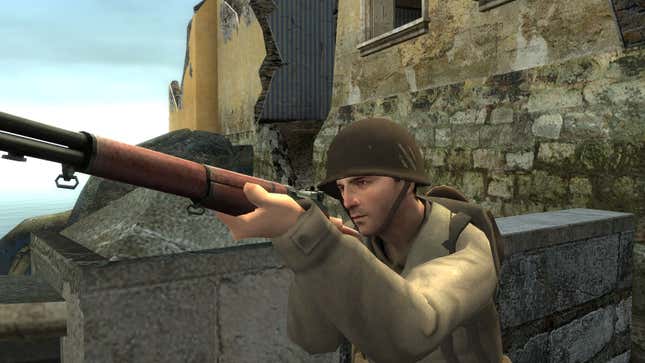
Like all units, the 11th CID eventually crumbled due to natural disinterest in the game and life commitments. I still talk to my friends from those days and we look back on the time fondly. My time in units taught me a lot about being part of a community. During the best of times, it felt like a home away from home. But often, the culture’s focus on rank and status brought out the worst in people. I learned about leading a group of people and how not to abuse the power I’m given. I also learned to be more critical of the people I look up to. Scrims taught me some skills that I still use in games. When I started playing Rainbow Six Siege, I was already attuned to how a defense should be set up to cover multiple angles, and how not to shoot teammates among the chaos of the match.
I do miss scrims and a larger sense of community, but I’m long done with units. I’m grateful for the experience, but retirement suits me.
As I prepared to write this story, I wanted to reach out to Seadog and talk about the FSSF days. Turns out, a few years ago he pulled a pretty similar move to us. He left the FSSF to form the 70th Infantry Division. He’s still going strong there as colonel, teaching drills and running meetings just like always. During the 2016 election cycle, he used his platform to stump for Donald Trump.
I reached out to him the only way I know how: the 70th ID forums. I made an account and was approved by one of his lieutenants. The lieutenant and I chatted for a bit. I told him about the story and let him know I was one of the founders of the 11th CID. He had definitely heard of us. I wondered if Seadog, who I figure must now be well into his 70s at least, was still holding a grudge over our leaving. The lieutenant assured me that he was probably over it after so long.
In my message to Seadog, I was honest about my intentions. I told him I wanted an interview, but I also just wanted to catch up. I apologized for any pain I caused by leaving all those years ago. A few hours later, I logged onto the forums to check my inbox. Instead of a reply, I found that my account ha banned. He had nothing else to say to me. Seadog has corralled a new group of teenagers that worship the ground he walks on, and I think that’s right where he wants to be: forever reliving an old war inside of a dying game.

